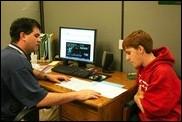Freshman advising becomes graduation requirement

Adviser Marc Boele discusses requirements with freshman Joel Boros.:Diane DeRemer
February 20, 2007
Sacramento State freshmen will receive academic advising in three phases this semester to help them do better throughout their college careers and graduate within four years.
Kathryn Palmieri, coordinator of freshman programs and advising, said the new program’s goals for the university to retain and graduate more students and graduate them quicker.
Palmieri said Sac State wants to give students a mandatory freshman advising program at the beginning that uses a three-phased approach, which includes summer orientation, one-on-one advising and the establishment of a long-term academic plan.
Freshmen are now involved in the program’s second phase, which consists of individual meetings with an adviser.
These meetings are two-pronged, Palmieri said. Students talk about classes they’d like to take in the spring and discuss CHOICES – an online career assessment.
“People can go online and do this, or just go to the career center and get results. Basically, it just shows them interest evaluation and some direction,” Palmieri said.
As a result of these meetings, the Academic Advising Center will be very busy up to Thanksgiving, Palmieri said.
Palmieri said it’s been busy so far, noting that on one day there were seven appointments that were all scheduled for 11 a.m.
“Basically, everyone in the office is going to be busy helping these freshmen, so the wait time for drop ins will increase,” Palmieri said.
The meetings will take about a half hour, and students will be able to talk about the results of their assessment through CHOICES and the classes that will help them explore the direction they want to go, Palmieri said.
Miguel Cortez, one of the student advisers, said he thinks the freshmen advising is a good idea. “It’s a good way to keep them on track,” Cortez said.
Cortez said e-mails are sent to freshmen who aren’t in freshman seminar classes. Then, the students take a test detailing the students’ personality online. This test reveals if he or she is, among many things, enterprising, artistic, social or investigative.
“These qualities are put in numerical order as to what they most are,” Cortez said.
Then the search for a fitting course of study begins.
“We don’t want to pin a major on anyone,” Cortez said. “We want to give them ideas on what they might be interested in taking.”
Freshman Gregory Cramer, who just participated in the second phase, said he was initially skeptical about the mandatory phase, but realized how helpful it was.
“It pretty much just guided me on different areas that I might be interested in,” Cramer said. “It really clarified things, like the classes I need to take. “
Cortez said students should know that the Academic Advising Center is there to help and come away with a new connection with the campus.
The third phase will take place in the spring, before fall registration. This phase involves long-range academic planning, according to the Academic Advising Center.
Further career/major exploration with major departments and the Career Center will be discussed and advising contacts in potential major departments will be initiated.
“We want the student to look long-term,” Palmieri said. “Whether the student is on the four-year plan or otherwise, we want to sit down, map it out, and talk about further career options, internships, and things that will make you marketable.”
This new program is not mandatory for all freshmen; freshmen affiliated with another program, like the Educational Equity Program, Athletic Advising, Liberal Studies, or Child Development have their own advising programs.
“The idea in that first year is to give freshman as much support as possible,” Palmieri said. “Research shows that students who have a positive contact on campus do better, so we want to support new students in any way that we can.”
The first phase of the program was the mandatory summer orientation where students met with an adviser who reviewed the students’ courses of interest and helped them choose the classes that best met their academic goals, according to the Academic Advising Center.




























































































































